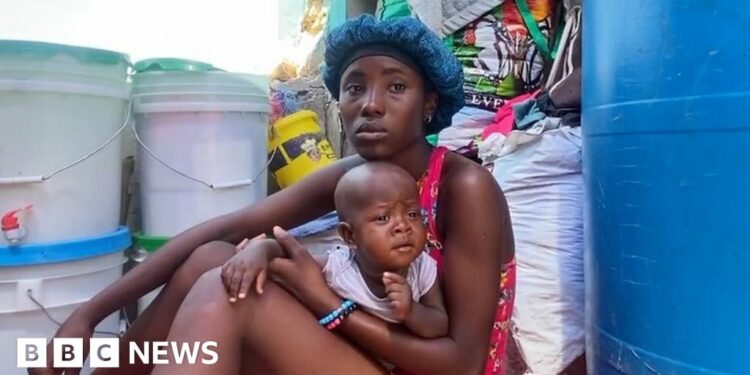Sarah Molin’s life reflects the depth of Haiti’s problems.
A year ago, the 20-year-old was a computer science student living in a suburb of the capital, Port-au-Prince.
But the failed state that Haiti is rapidly becoming has failed its young people most of all.
Months of turmoil and political instability following the murder of President Jovenel MoĂŻse in July 2021 have culminated in the current spate of extreme gang violence.
The fighting has already claimed many thousands of victims, from those whose bodies lie strewn in the streets, to others like Sarah and her family who were forced from their home last August and now live inside an abandoned cinema.
Around 100 families have set up a makeshift camp inside the condemned building which, under normal circumstances, would not be deemed fit for human habitation. There is no sewerage or running water, and Sarah says their daily struggles to find food are becoming critical.
“Sometimes we find food, sometimes we don’t,” she explains in a weary voice.
Juggling her baby godson on her knee – her extended family is all in the camp at the disused Rex Cinema – she gives the appearance of a much older woman.
“I go to school with no food, spend the day hungry and then go to bed still with nothing in my stomach,” she explains.
Many in the camp are suffering from illnesses. Sarah says disease is now spreading through their squatter community. Drugs and medicines are often prohibitively expensive given their food budget rarely stretches to the basics.
“With six dollars we can provide for the family of four people (all adults) for a day,” she says. On the days they can’t raise those funds, they’re dependent on scarce donations and aid. Even that can compound Sarah’s sense of loss instead of bringing her some much-needed compassion.
“Sometimes the staff act like they’re doing us a favour when they give out the aid, and we feel humiliated,” she says, “as though we were taking their food instead of donations.”
Sarah is just one of more than 360,000 internally displaced people in Haiti.
Helicopter flights bringing aid in from the Dominican Republic have begun to arrive. But with the airport in Port-au-Prince and the port both still closed, far more is needed each week.
Source link : http://www.bing.com/news/apiclick.aspx?ref=FexRss&aid=&tid=6756ca6b912a4935bf5f339792945843&url=https%3A%2F%2Fwww.bbc.co.uk%2Fnews%2Fworld-latin-america-68622814&c=8628349072220388725&mkt=en-us
Author :
Publish date : 2024-03-20 19:16:00
Copyright for syndicated content belongs to the linked Source.












